The Significance of Therapeutic Communication in Healthcare
VerifiedAdded on 2023/03/31
|8
|1546
|311
Essay
AI Summary
This essay delves into the concept of therapeutic communication within healthcare settings, emphasizing its crucial role in fostering patient well-being. It defines therapeutic communication as face-to-face interactions between healthcare providers and patients, essential for both physical and emotional health. The essay explores the components of therapeutic communication, including trust, empathy, and non-judgmental attitudes, highlighting the importance of verbal and nonverbal communication techniques. It examines how these elements contribute to establishing strong nurse-client relationships and positive health outcomes, while also acknowledging the absence of disadvantages associated with therapeutic communication. The essay further discusses specific techniques such as active listening and paraphrasing, and their impact on reducing patient stress and anxiety. Concluding that therapeutic communication is a cornerstone of effective nursing care and is vital for achieving patient-centered goals, this essay emphasizes the importance of privacy, confidentiality, and the role of a therapeutic environment in promoting healing.
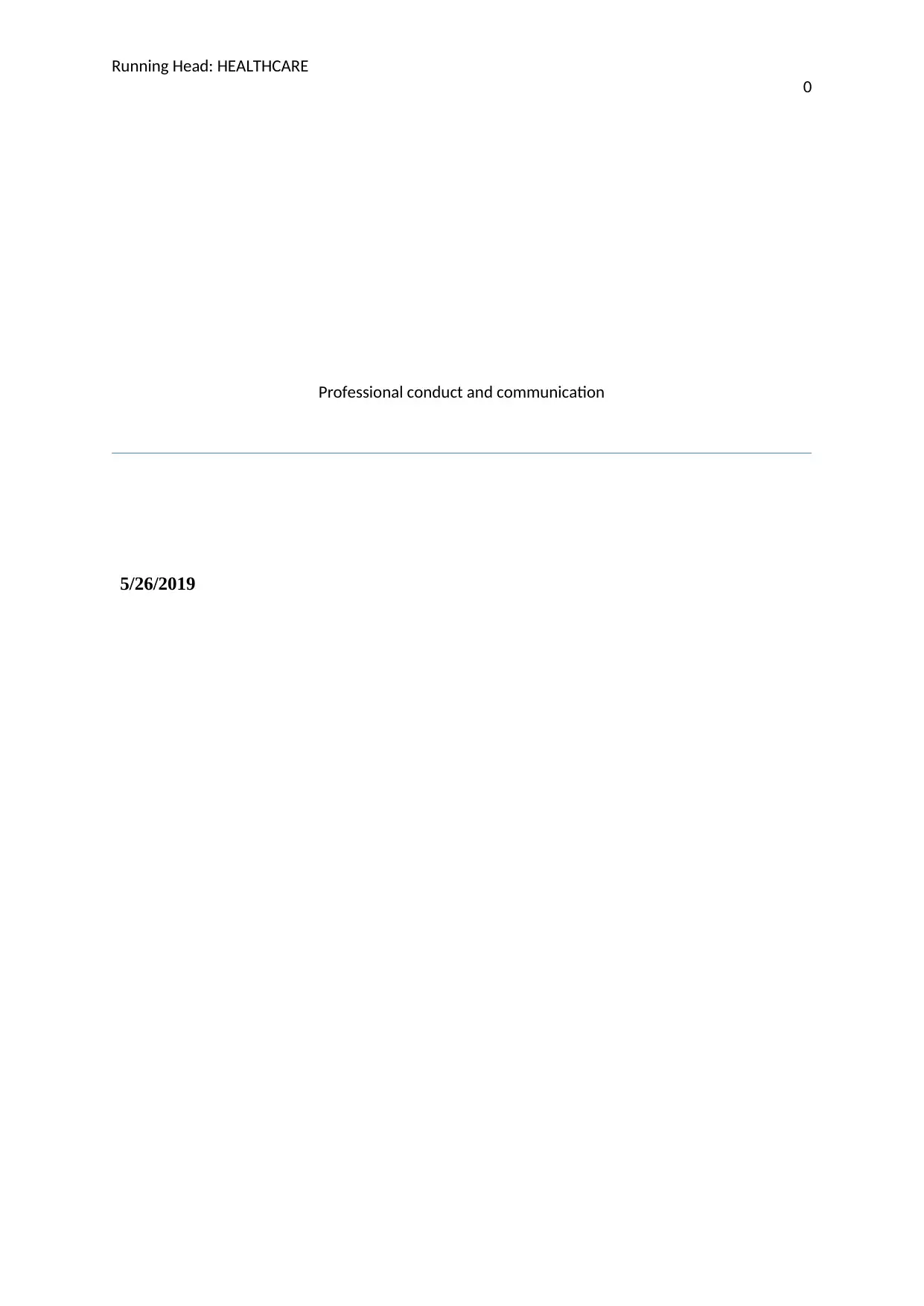
Running Head: HEALTHCARE
0
Professional conduct and communication
5/26/2019
0
Professional conduct and communication
5/26/2019
Paraphrase This Document
Need a fresh take? Get an instant paraphrase of this document with our AI Paraphraser
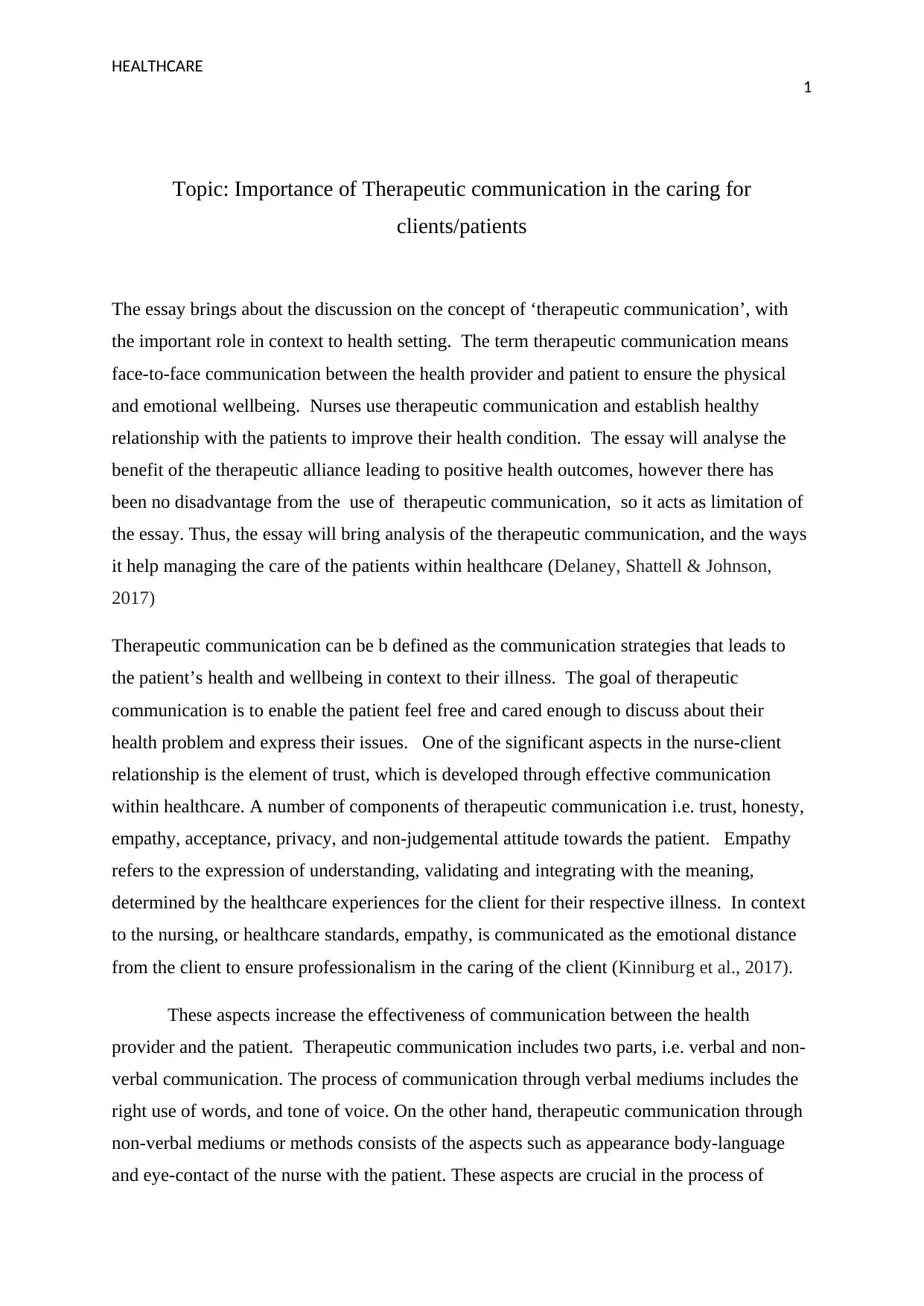
HEALTHCARE
1
Topic: Importance of Therapeutic communication in the caring for
clients/patients
The essay brings about the discussion on the concept of ‘therapeutic communication’, with
the important role in context to health setting. The term therapeutic communication means
face-to-face communication between the health provider and patient to ensure the physical
and emotional wellbeing. Nurses use therapeutic communication and establish healthy
relationship with the patients to improve their health condition. The essay will analyse the
benefit of the therapeutic alliance leading to positive health outcomes, however there has
been no disadvantage from the use of therapeutic communication, so it acts as limitation of
the essay. Thus, the essay will bring analysis of the therapeutic communication, and the ways
it help managing the care of the patients within healthcare (Delaney, Shattell & Johnson,
2017)
Therapeutic communication can be b defined as the communication strategies that leads to
the patient’s health and wellbeing in context to their illness. The goal of therapeutic
communication is to enable the patient feel free and cared enough to discuss about their
health problem and express their issues. One of the significant aspects in the nurse-client
relationship is the element of trust, which is developed through effective communication
within healthcare. A number of components of therapeutic communication i.e. trust, honesty,
empathy, acceptance, privacy, and non-judgemental attitude towards the patient. Empathy
refers to the expression of understanding, validating and integrating with the meaning,
determined by the healthcare experiences for the client for their respective illness. In context
to the nursing, or healthcare standards, empathy, is communicated as the emotional distance
from the client to ensure professionalism in the caring of the client (Kinniburg et al., 2017).
These aspects increase the effectiveness of communication between the health
provider and the patient. Therapeutic communication includes two parts, i.e. verbal and non-
verbal communication. The process of communication through verbal mediums includes the
right use of words, and tone of voice. On the other hand, therapeutic communication through
non-verbal mediums or methods consists of the aspects such as appearance body-language
and eye-contact of the nurse with the patient. These aspects are crucial in the process of
1
Topic: Importance of Therapeutic communication in the caring for
clients/patients
The essay brings about the discussion on the concept of ‘therapeutic communication’, with
the important role in context to health setting. The term therapeutic communication means
face-to-face communication between the health provider and patient to ensure the physical
and emotional wellbeing. Nurses use therapeutic communication and establish healthy
relationship with the patients to improve their health condition. The essay will analyse the
benefit of the therapeutic alliance leading to positive health outcomes, however there has
been no disadvantage from the use of therapeutic communication, so it acts as limitation of
the essay. Thus, the essay will bring analysis of the therapeutic communication, and the ways
it help managing the care of the patients within healthcare (Delaney, Shattell & Johnson,
2017)
Therapeutic communication can be b defined as the communication strategies that leads to
the patient’s health and wellbeing in context to their illness. The goal of therapeutic
communication is to enable the patient feel free and cared enough to discuss about their
health problem and express their issues. One of the significant aspects in the nurse-client
relationship is the element of trust, which is developed through effective communication
within healthcare. A number of components of therapeutic communication i.e. trust, honesty,
empathy, acceptance, privacy, and non-judgemental attitude towards the patient. Empathy
refers to the expression of understanding, validating and integrating with the meaning,
determined by the healthcare experiences for the client for their respective illness. In context
to the nursing, or healthcare standards, empathy, is communicated as the emotional distance
from the client to ensure professionalism in the caring of the client (Kinniburg et al., 2017).
These aspects increase the effectiveness of communication between the health
provider and the patient. Therapeutic communication includes two parts, i.e. verbal and non-
verbal communication. The process of communication through verbal mediums includes the
right use of words, and tone of voice. On the other hand, therapeutic communication through
non-verbal mediums or methods consists of the aspects such as appearance body-language
and eye-contact of the nurse with the patient. These aspects are crucial in the process of
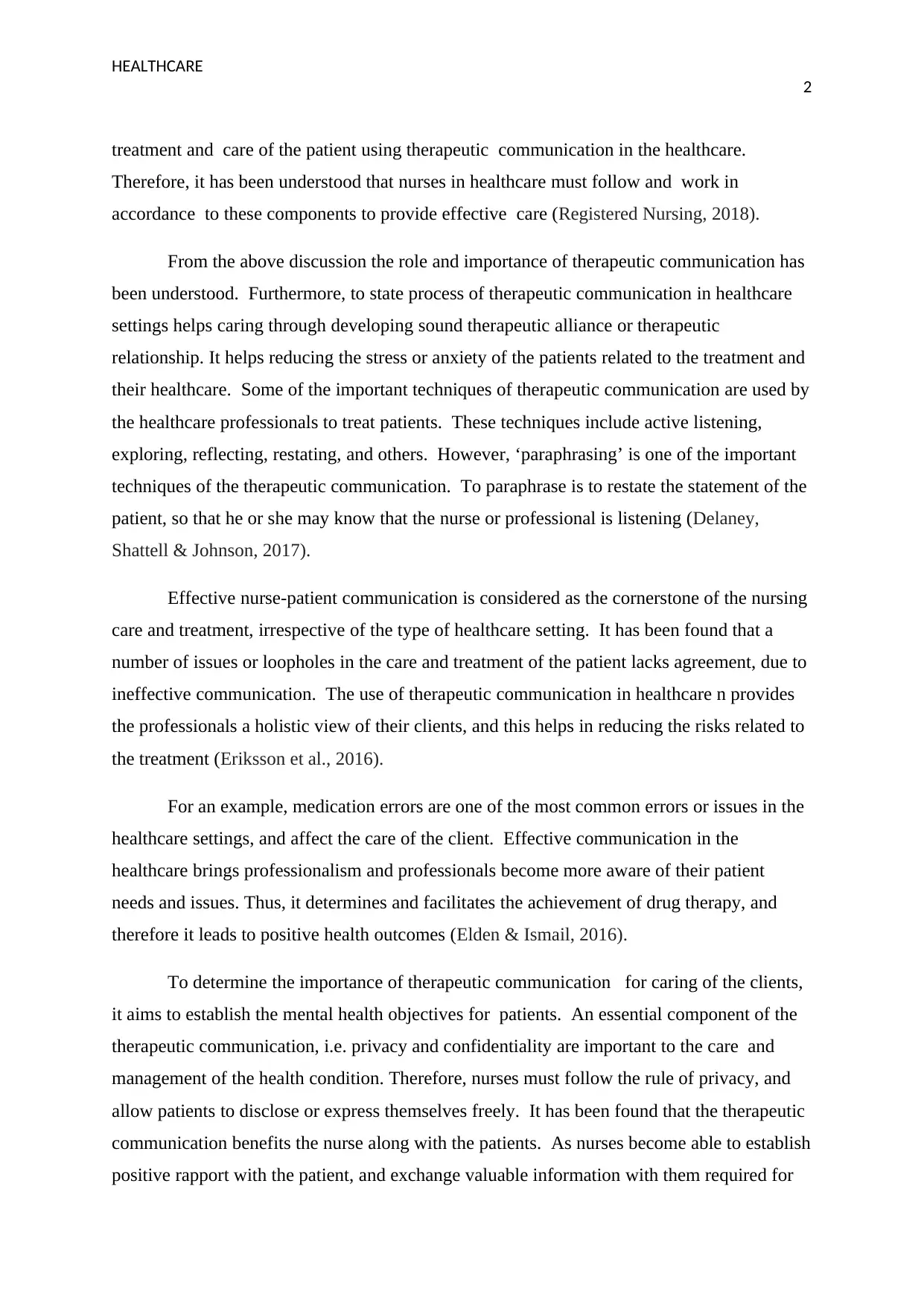
HEALTHCARE
2
treatment and care of the patient using therapeutic communication in the healthcare.
Therefore, it has been understood that nurses in healthcare must follow and work in
accordance to these components to provide effective care (Registered Nursing, 2018).
From the above discussion the role and importance of therapeutic communication has
been understood. Furthermore, to state process of therapeutic communication in healthcare
settings helps caring through developing sound therapeutic alliance or therapeutic
relationship. It helps reducing the stress or anxiety of the patients related to the treatment and
their healthcare. Some of the important techniques of therapeutic communication are used by
the healthcare professionals to treat patients. These techniques include active listening,
exploring, reflecting, restating, and others. However, ‘paraphrasing’ is one of the important
techniques of the therapeutic communication. To paraphrase is to restate the statement of the
patient, so that he or she may know that the nurse or professional is listening (Delaney,
Shattell & Johnson, 2017).
Effective nurse-patient communication is considered as the cornerstone of the nursing
care and treatment, irrespective of the type of healthcare setting. It has been found that a
number of issues or loopholes in the care and treatment of the patient lacks agreement, due to
ineffective communication. The use of therapeutic communication in healthcare n provides
the professionals a holistic view of their clients, and this helps in reducing the risks related to
the treatment (Eriksson et al., 2016).
For an example, medication errors are one of the most common errors or issues in the
healthcare settings, and affect the care of the client. Effective communication in the
healthcare brings professionalism and professionals become more aware of their patient
needs and issues. Thus, it determines and facilitates the achievement of drug therapy, and
therefore it leads to positive health outcomes (Elden & Ismail, 2016).
To determine the importance of therapeutic communication for caring of the clients,
it aims to establish the mental health objectives for patients. An essential component of the
therapeutic communication, i.e. privacy and confidentiality are important to the care and
management of the health condition. Therefore, nurses must follow the rule of privacy, and
allow patients to disclose or express themselves freely. It has been found that the therapeutic
communication benefits the nurse along with the patients. As nurses become able to establish
positive rapport with the patient, and exchange valuable information with them required for
2
treatment and care of the patient using therapeutic communication in the healthcare.
Therefore, it has been understood that nurses in healthcare must follow and work in
accordance to these components to provide effective care (Registered Nursing, 2018).
From the above discussion the role and importance of therapeutic communication has
been understood. Furthermore, to state process of therapeutic communication in healthcare
settings helps caring through developing sound therapeutic alliance or therapeutic
relationship. It helps reducing the stress or anxiety of the patients related to the treatment and
their healthcare. Some of the important techniques of therapeutic communication are used by
the healthcare professionals to treat patients. These techniques include active listening,
exploring, reflecting, restating, and others. However, ‘paraphrasing’ is one of the important
techniques of the therapeutic communication. To paraphrase is to restate the statement of the
patient, so that he or she may know that the nurse or professional is listening (Delaney,
Shattell & Johnson, 2017).
Effective nurse-patient communication is considered as the cornerstone of the nursing
care and treatment, irrespective of the type of healthcare setting. It has been found that a
number of issues or loopholes in the care and treatment of the patient lacks agreement, due to
ineffective communication. The use of therapeutic communication in healthcare n provides
the professionals a holistic view of their clients, and this helps in reducing the risks related to
the treatment (Eriksson et al., 2016).
For an example, medication errors are one of the most common errors or issues in the
healthcare settings, and affect the care of the client. Effective communication in the
healthcare brings professionalism and professionals become more aware of their patient
needs and issues. Thus, it determines and facilitates the achievement of drug therapy, and
therefore it leads to positive health outcomes (Elden & Ismail, 2016).
To determine the importance of therapeutic communication for caring of the clients,
it aims to establish the mental health objectives for patients. An essential component of the
therapeutic communication, i.e. privacy and confidentiality are important to the care and
management of the health condition. Therefore, nurses must follow the rule of privacy, and
allow patients to disclose or express themselves freely. It has been found that the therapeutic
communication benefits the nurse along with the patients. As nurses become able to establish
positive rapport with the patient, and exchange valuable information with them required for
⊘ This is a preview!⊘
Do you want full access?
Subscribe today to unlock all pages.

Trusted by 1+ million students worldwide
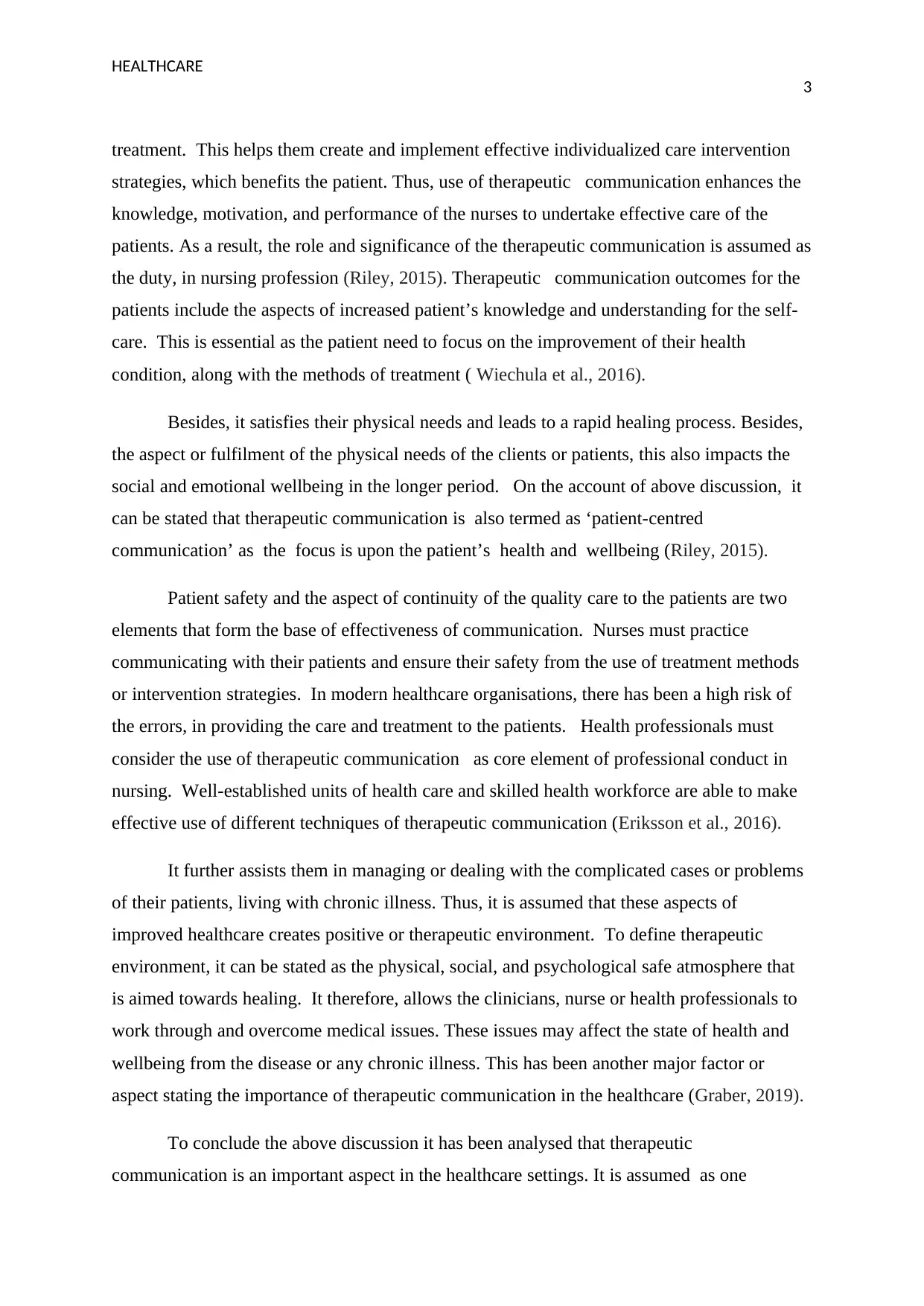
HEALTHCARE
3
treatment. This helps them create and implement effective individualized care intervention
strategies, which benefits the patient. Thus, use of therapeutic communication enhances the
knowledge, motivation, and performance of the nurses to undertake effective care of the
patients. As a result, the role and significance of the therapeutic communication is assumed as
the duty, in nursing profession (Riley, 2015). Therapeutic communication outcomes for the
patients include the aspects of increased patient’s knowledge and understanding for the self-
care. This is essential as the patient need to focus on the improvement of their health
condition, along with the methods of treatment ( Wiechula et al., 2016).
Besides, it satisfies their physical needs and leads to a rapid healing process. Besides,
the aspect or fulfilment of the physical needs of the clients or patients, this also impacts the
social and emotional wellbeing in the longer period. On the account of above discussion, it
can be stated that therapeutic communication is also termed as ‘patient-centred
communication’ as the focus is upon the patient’s health and wellbeing (Riley, 2015).
Patient safety and the aspect of continuity of the quality care to the patients are two
elements that form the base of effectiveness of communication. Nurses must practice
communicating with their patients and ensure their safety from the use of treatment methods
or intervention strategies. In modern healthcare organisations, there has been a high risk of
the errors, in providing the care and treatment to the patients. Health professionals must
consider the use of therapeutic communication as core element of professional conduct in
nursing. Well-established units of health care and skilled health workforce are able to make
effective use of different techniques of therapeutic communication (Eriksson et al., 2016).
It further assists them in managing or dealing with the complicated cases or problems
of their patients, living with chronic illness. Thus, it is assumed that these aspects of
improved healthcare creates positive or therapeutic environment. To define therapeutic
environment, it can be stated as the physical, social, and psychological safe atmosphere that
is aimed towards healing. It therefore, allows the clinicians, nurse or health professionals to
work through and overcome medical issues. These issues may affect the state of health and
wellbeing from the disease or any chronic illness. This has been another major factor or
aspect stating the importance of therapeutic communication in the healthcare (Graber, 2019).
To conclude the above discussion it has been analysed that therapeutic
communication is an important aspect in the healthcare settings. It is assumed as one
3
treatment. This helps them create and implement effective individualized care intervention
strategies, which benefits the patient. Thus, use of therapeutic communication enhances the
knowledge, motivation, and performance of the nurses to undertake effective care of the
patients. As a result, the role and significance of the therapeutic communication is assumed as
the duty, in nursing profession (Riley, 2015). Therapeutic communication outcomes for the
patients include the aspects of increased patient’s knowledge and understanding for the self-
care. This is essential as the patient need to focus on the improvement of their health
condition, along with the methods of treatment ( Wiechula et al., 2016).
Besides, it satisfies their physical needs and leads to a rapid healing process. Besides,
the aspect or fulfilment of the physical needs of the clients or patients, this also impacts the
social and emotional wellbeing in the longer period. On the account of above discussion, it
can be stated that therapeutic communication is also termed as ‘patient-centred
communication’ as the focus is upon the patient’s health and wellbeing (Riley, 2015).
Patient safety and the aspect of continuity of the quality care to the patients are two
elements that form the base of effectiveness of communication. Nurses must practice
communicating with their patients and ensure their safety from the use of treatment methods
or intervention strategies. In modern healthcare organisations, there has been a high risk of
the errors, in providing the care and treatment to the patients. Health professionals must
consider the use of therapeutic communication as core element of professional conduct in
nursing. Well-established units of health care and skilled health workforce are able to make
effective use of different techniques of therapeutic communication (Eriksson et al., 2016).
It further assists them in managing or dealing with the complicated cases or problems
of their patients, living with chronic illness. Thus, it is assumed that these aspects of
improved healthcare creates positive or therapeutic environment. To define therapeutic
environment, it can be stated as the physical, social, and psychological safe atmosphere that
is aimed towards healing. It therefore, allows the clinicians, nurse or health professionals to
work through and overcome medical issues. These issues may affect the state of health and
wellbeing from the disease or any chronic illness. This has been another major factor or
aspect stating the importance of therapeutic communication in the healthcare (Graber, 2019).
To conclude the above discussion it has been analysed that therapeutic
communication is an important aspect in the healthcare settings. It is assumed as one
Paraphrase This Document
Need a fresh take? Get an instant paraphrase of this document with our AI Paraphraser
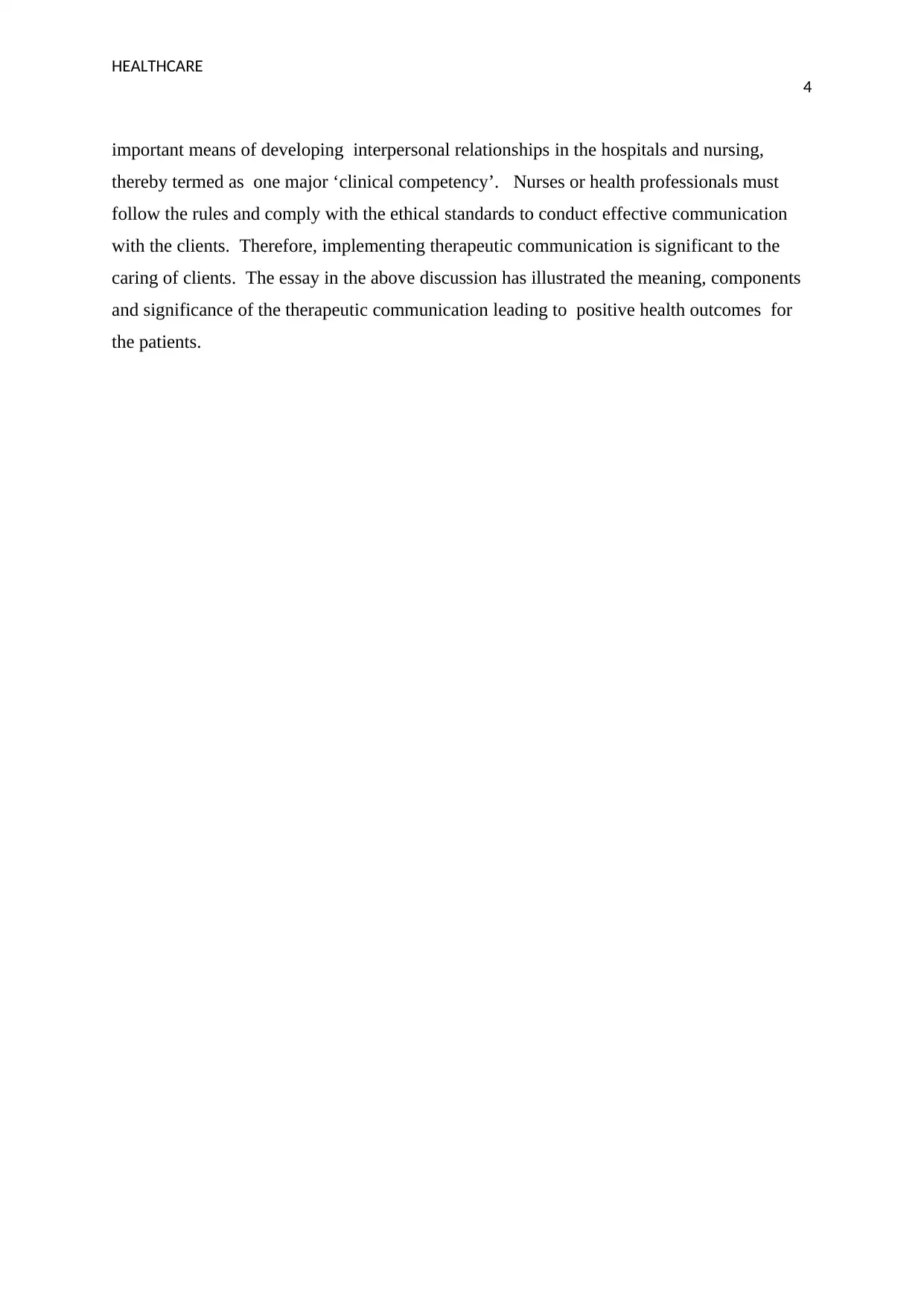
HEALTHCARE
4
important means of developing interpersonal relationships in the hospitals and nursing,
thereby termed as one major ‘clinical competency’. Nurses or health professionals must
follow the rules and comply with the ethical standards to conduct effective communication
with the clients. Therefore, implementing therapeutic communication is significant to the
caring of clients. The essay in the above discussion has illustrated the meaning, components
and significance of the therapeutic communication leading to positive health outcomes for
the patients.
4
important means of developing interpersonal relationships in the hospitals and nursing,
thereby termed as one major ‘clinical competency’. Nurses or health professionals must
follow the rules and comply with the ethical standards to conduct effective communication
with the clients. Therefore, implementing therapeutic communication is significant to the
caring of clients. The essay in the above discussion has illustrated the meaning, components
and significance of the therapeutic communication leading to positive health outcomes for
the patients.

HEALTHCARE
5
5
⊘ This is a preview!⊘
Do you want full access?
Subscribe today to unlock all pages.

Trusted by 1+ million students worldwide
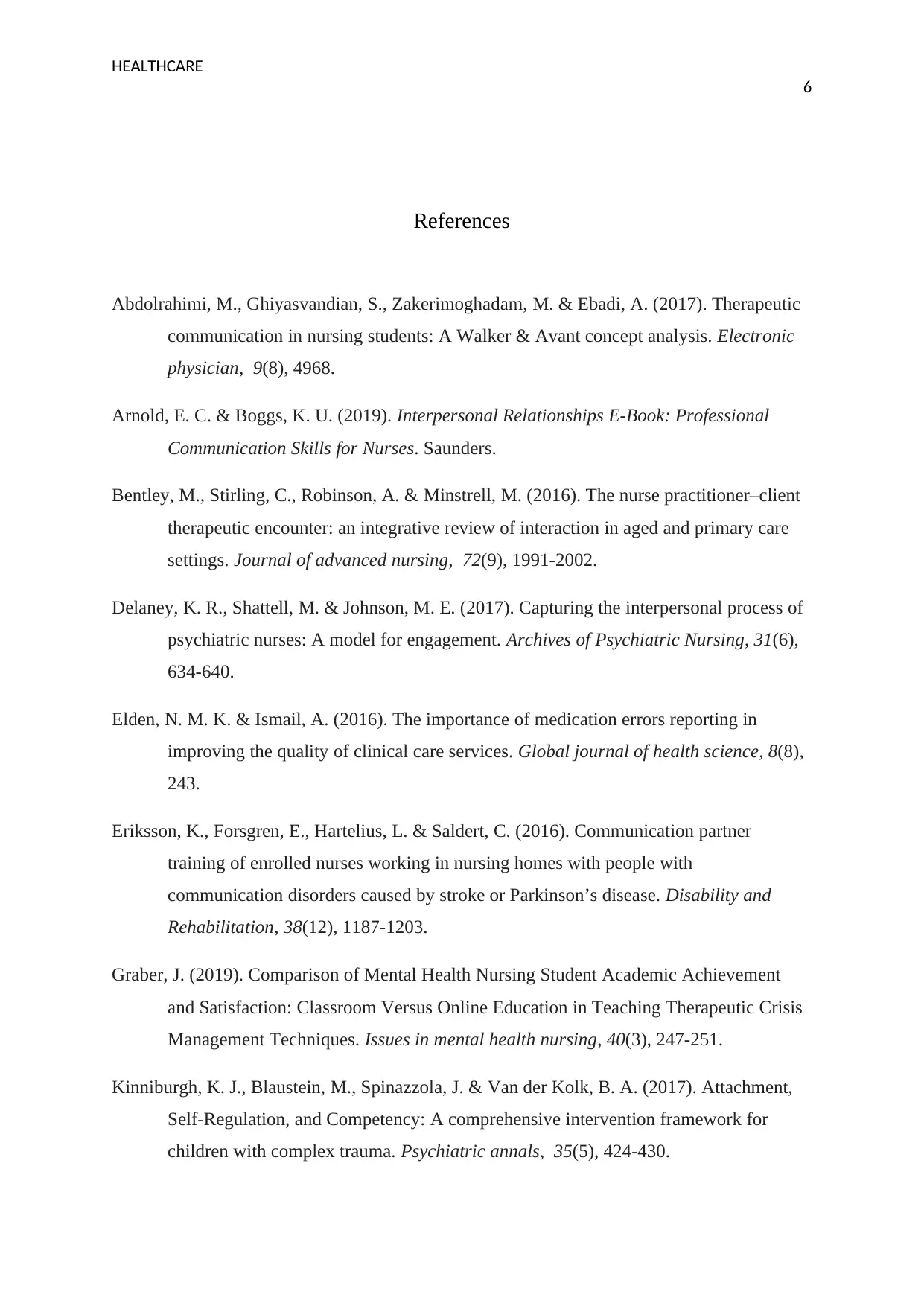
HEALTHCARE
6
References
Abdolrahimi, M., Ghiyasvandian, S., Zakerimoghadam, M. & Ebadi, A. (2017). Therapeutic
communication in nursing students: A Walker & Avant concept analysis. Electronic
physician, 9(8), 4968.
Arnold, E. C. & Boggs, K. U. (2019). Interpersonal Relationships E-Book: Professional
Communication Skills for Nurses. Saunders.
Bentley, M., Stirling, C., Robinson, A. & Minstrell, M. (2016). The nurse practitioner–client
therapeutic encounter: an integrative review of interaction in aged and primary care
settings. Journal of advanced nursing, 72(9), 1991-2002.
Delaney, K. R., Shattell, M. & Johnson, M. E. (2017). Capturing the interpersonal process of
psychiatric nurses: A model for engagement. Archives of Psychiatric Nursing, 31(6),
634-640.
Elden, N. M. K. & Ismail, A. (2016). The importance of medication errors reporting in
improving the quality of clinical care services. Global journal of health science, 8(8),
243.
Eriksson, K., Forsgren, E., Hartelius, L. & Saldert, C. (2016). Communication partner
training of enrolled nurses working in nursing homes with people with
communication disorders caused by stroke or Parkinson’s disease. Disability and
Rehabilitation, 38(12), 1187-1203.
Graber, J. (2019). Comparison of Mental Health Nursing Student Academic Achievement
and Satisfaction: Classroom Versus Online Education in Teaching Therapeutic Crisis
Management Techniques. Issues in mental health nursing, 40(3), 247-251.
Kinniburgh, K. J., Blaustein, M., Spinazzola, J. & Van der Kolk, B. A. (2017). Attachment,
Self-Regulation, and Competency: A comprehensive intervention framework for
children with complex trauma. Psychiatric annals, 35(5), 424-430.
6
References
Abdolrahimi, M., Ghiyasvandian, S., Zakerimoghadam, M. & Ebadi, A. (2017). Therapeutic
communication in nursing students: A Walker & Avant concept analysis. Electronic
physician, 9(8), 4968.
Arnold, E. C. & Boggs, K. U. (2019). Interpersonal Relationships E-Book: Professional
Communication Skills for Nurses. Saunders.
Bentley, M., Stirling, C., Robinson, A. & Minstrell, M. (2016). The nurse practitioner–client
therapeutic encounter: an integrative review of interaction in aged and primary care
settings. Journal of advanced nursing, 72(9), 1991-2002.
Delaney, K. R., Shattell, M. & Johnson, M. E. (2017). Capturing the interpersonal process of
psychiatric nurses: A model for engagement. Archives of Psychiatric Nursing, 31(6),
634-640.
Elden, N. M. K. & Ismail, A. (2016). The importance of medication errors reporting in
improving the quality of clinical care services. Global journal of health science, 8(8),
243.
Eriksson, K., Forsgren, E., Hartelius, L. & Saldert, C. (2016). Communication partner
training of enrolled nurses working in nursing homes with people with
communication disorders caused by stroke or Parkinson’s disease. Disability and
Rehabilitation, 38(12), 1187-1203.
Graber, J. (2019). Comparison of Mental Health Nursing Student Academic Achievement
and Satisfaction: Classroom Versus Online Education in Teaching Therapeutic Crisis
Management Techniques. Issues in mental health nursing, 40(3), 247-251.
Kinniburgh, K. J., Blaustein, M., Spinazzola, J. & Van der Kolk, B. A. (2017). Attachment,
Self-Regulation, and Competency: A comprehensive intervention framework for
children with complex trauma. Psychiatric annals, 35(5), 424-430.
Paraphrase This Document
Need a fresh take? Get an instant paraphrase of this document with our AI Paraphraser
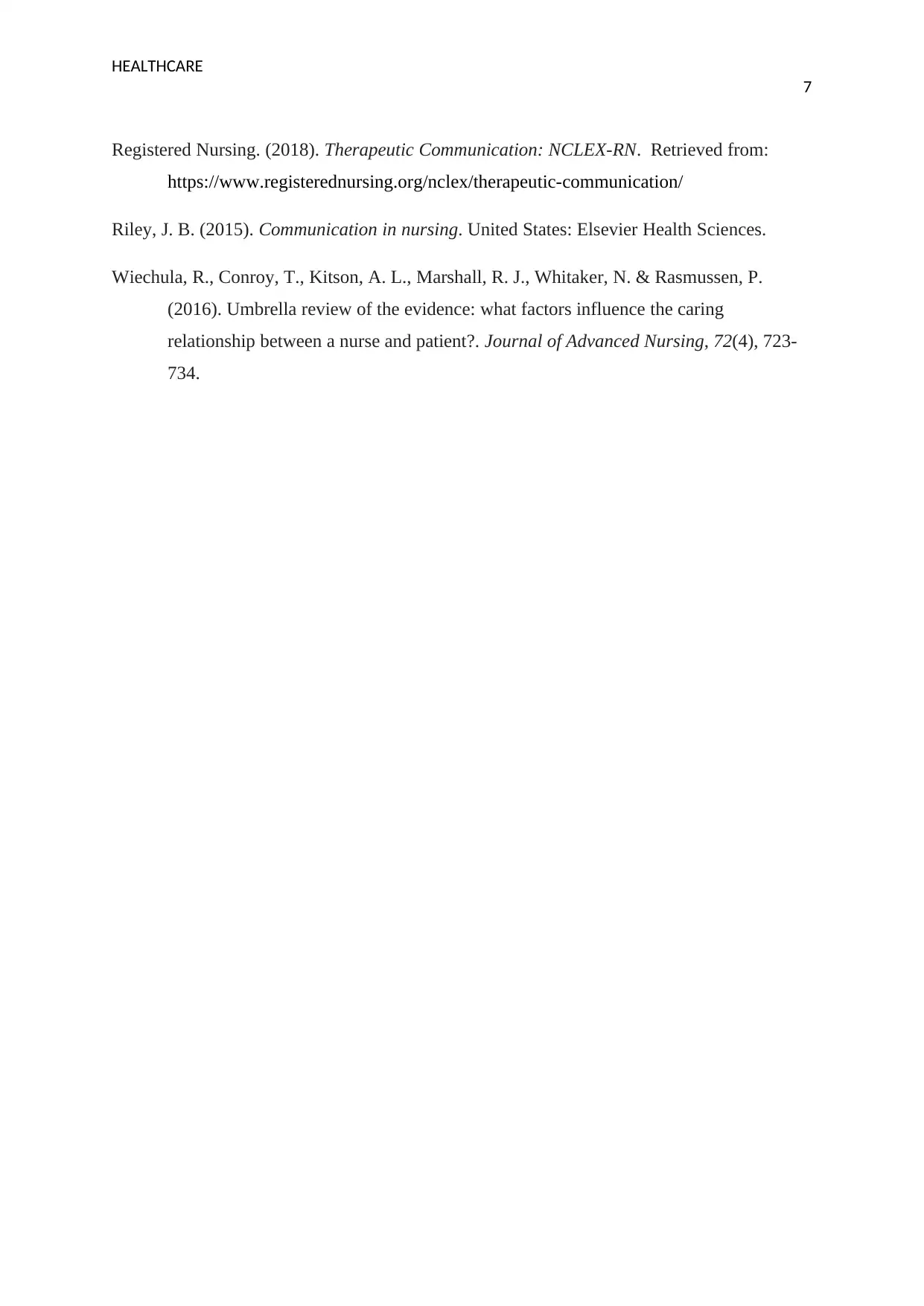
HEALTHCARE
7
Registered Nursing. (2018). Therapeutic Communication: NCLEX-RN. Retrieved from:
https://www.registerednursing.org/nclex/therapeutic-communication/
Riley, J. B. (2015). Communication in nursing. United States: Elsevier Health Sciences.
Wiechula, R., Conroy, T., Kitson, A. L., Marshall, R. J., Whitaker, N. & Rasmussen, P.
(2016). Umbrella review of the evidence: what factors influence the caring
relationship between a nurse and patient?. Journal of Advanced Nursing, 72(4), 723-
734.
7
Registered Nursing. (2018). Therapeutic Communication: NCLEX-RN. Retrieved from:
https://www.registerednursing.org/nclex/therapeutic-communication/
Riley, J. B. (2015). Communication in nursing. United States: Elsevier Health Sciences.
Wiechula, R., Conroy, T., Kitson, A. L., Marshall, R. J., Whitaker, N. & Rasmussen, P.
(2016). Umbrella review of the evidence: what factors influence the caring
relationship between a nurse and patient?. Journal of Advanced Nursing, 72(4), 723-
734.
1 out of 8
Related Documents
Your All-in-One AI-Powered Toolkit for Academic Success.
+13062052269
info@desklib.com
Available 24*7 on WhatsApp / Email
![[object Object]](/_next/static/media/star-bottom.7253800d.svg)
Unlock your academic potential
Copyright © 2020–2026 A2Z Services. All Rights Reserved. Developed and managed by ZUCOL.





